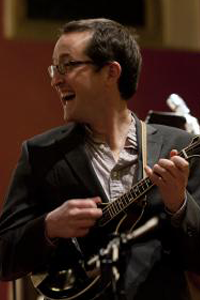
Joan Harrison
Alum
Joe Walsh
Position
Instructor
Affiliated Departments
Telephone
617-747-6266
For media inquiries, please contact Media Relations
Career Highlights
- Recordings with the Gibson Brothers (Ring the Bell and Help My Brother), two solo records (Saturday Night Waltz and Sweet Loam), and various recordings with Jonathan Edwards, Joy Kills Sorrow, Scott Nygaard, and others
- Performances with Emmylou Harris, Bela Fleck, John Scofield, Tracy Bohnam, Ricky Skaggs, Marty Stuart, and Alison Brown
- Performances at the Ryman Auditorium, the Kennedy Center, the International Bluegrass Festival in Buhl, Germany; and in Denmark, Ireland, France, and Italy
- Member of the bluegrass band the Gibson Brothers
Awards
- Member of the bluegrass band the Gibson Brothers, awarded 2012 Entertainer of the Year, 2012 Gospel Song of the Year, 2011 Album of the Year, and 2010 Song of the Year by the International Bluegrass Music Association
In Their Own Words
